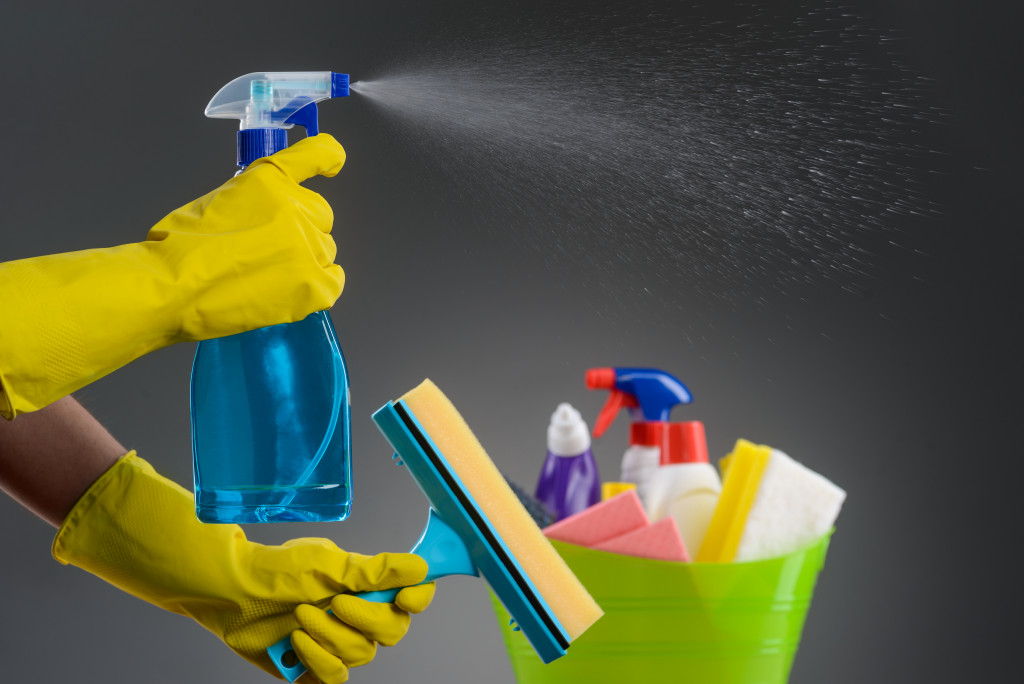Based on a study reported by the University of Pennsylvania Health System (PennMedicine), the coronavirus can stay in the air for as long as three hours. It’s one of the reasons why it’s important to minimize your stay in crowded areas—the risk of being exposed to the virus increases. According to the same study, the virus can also remain on surfaces such as stainless and plastic for three hours and cardboard for up to a whole day.
It’s true; COVID-19 is highly transmissible from person to person. There’s greater risk in that. However, the Centers for Disease Control and Prevention (CDC) states that due to the potential of the virus to remain on surfaces, they still recommend cleaning and disinfecting high-touch surfaces daily. They maintain their stand even for people who do nothing except stay home. The health agency argues that outsiders can come in and out of your house. The possibility of being exposed is highly considered.
The report from Penn Medicine and recommendation from CDC strengthens the importance of keeping your house clean and disinfected frequently. It’s crucial in keeping your entire household healthy and safe. To have an idea of how to keep your house virus-free, here are some tips from the experts.
Adopt Regular Cleaning Practices
At most times, you can decrease the risk of infection from surfaces with a simple cleaning. Using a household detergent, or even just a soap, to clean surfaces can reduce the number of germs. It can even remove nearly all virus particles on surfaces.
Disinfection is most likely needed if a person with the virus has been in your house within the last 24 hours. It is the same when someone in your family has been sick, even if you’re unsure it’s the virus. This is a necessary action to reduce the risk of transmission within your household.
When cleaning, focus on high-touch surfaces first, such as countertops, light switches, handles, tabletops, and doorknobs. Clean them regularly, at least once, daily. You might do this more than once if you had visitors. You may also do this more frequently within a day if someone in your household works in a high-risk industry. They might bring the virus home without anyone of you knowing. The idea here is prevention. If you are caught up in a hectic schedule, you can hire a house cleaning service to do the job for you.
To clean surfaces, choose the right products. For example, cleaning products for stainless surfaces may not work well with wooden surfaces. By simply choosing appropriate products, you can reduce the re-contamination of surfaces.
To really limit re-contamination, though, require everyone in your household to wash hands often. You must all do this, especially when returning home.

How to Clean and Disinfect Other Kinds of Surfaces
While it’s important to clean high-touch surfaces, you should also do the same with other surfaces in your house. Carpets, rugs, curtains, drapes, and even electronics should receive the same care.
For your electronics, consider cleaning your smartphone, computer, and laptop. Remote controls and game controllers must be cleaned as well. Don’t use disinfectant wipes on computer screens. Stick to an alcohol solution. Disinfectant wipes can damage plastic, which many computer screens today are actually made of. You can, however, use disinfectant wipes to clean your smartphone, game controllers, and remote controls.
For soft surfaces such as floor and window embellishments, use industry-approved products when disinfecting. You can wash them with soap or detergent for routine cleaning. You can also vacuum them as usual, but remember to wear a mask when doing so. Wash your hands after vacuuming.
Your clothes are also considered soft surfaces. You can wash them as usual, but wear a mask and gloves when handling clothes from a sick person.
How to Clean a Space Occupied by a Sick Person
It’s disheartening to have a COVID-infected loved one at home. There must be a separate set of utensils and dishes for your sick loved one. There should also be a separate lined trash can for the sick person.
It’s devastating if someone in your family is sick with the virus. And although you may feel this way, you still have to clean that person’s room and belongings.
To do it properly, ask the sick person to wear a mask before you enter the room. Clean as you would any other room in the house, but practice precaution. Limit contact as much as possible, and wear a mask and gloves. Make sure to wear gloves when you handle trash, dirty laundry, and used dishes. Throw away all the gloves you have used afterward.
If the sick person can do the cleaning, make sure to provide separate cleaning supplies and materials.
Protect Your Family
Your home should be a haven, and you can prevent the spread of COVID-19 at home and protect your family by following these tips. Now, you can take a deep breath and relax.











